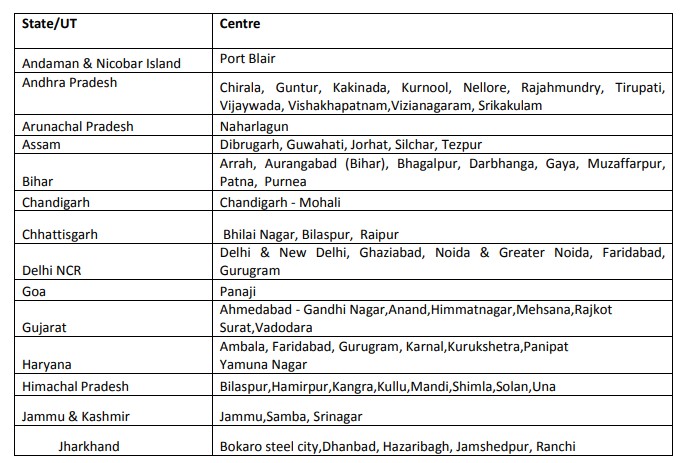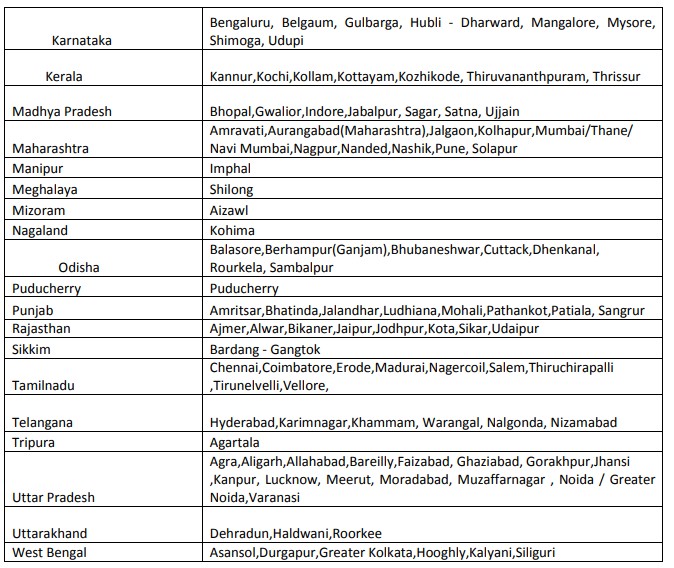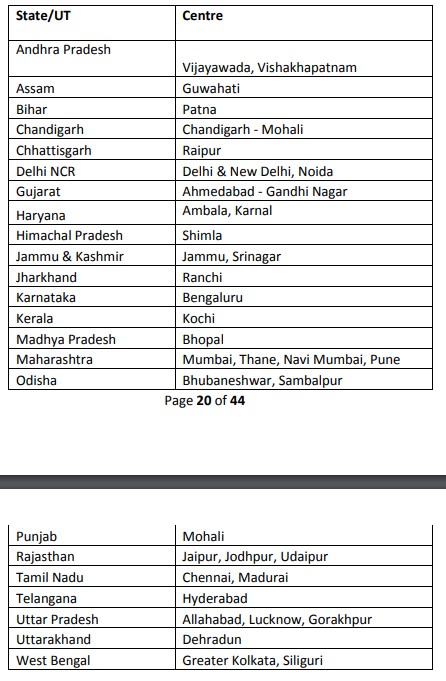FCI AE, JE, Steno Grade II, Assistant Grade III Exam Syllabus 2019 2020 | FCI Junior engineer (JE) (Civil Engineering / Electrical Mechanical Engineering), Assistant Grade- II (Assistant Grade II) (Hindi), Steno grade-II, Typist (Hindi) And assistant grade-III, (General / Accounts / Technical / Depot Syllabus and Exam Pattern are given on this pAssistant Gradee. So, candidates who are searching for the FCI Syllabus 2019 they can collect full PDF on this pAssistant Gradee. FCI AE, JE, Steno Grade II, Assistant Grade III Syllabus plays a prominent role in any exam preparation. Without having FCI AE, JE, Steno Grade II, Assistant Grade III syllabus and Exam pattern nobody can know which subjects to prepare for the examination. You can check all details of Madras High Court Syllabus here. Are you looking for the free download? Then go through this section.
FCI AE, JE, Steno Grade II, Assistant Grade III Selection Process:
The Selection Procedure of the Exam will be as follows:
| 1. | Online Exam
The online test will comprise of Phase-I and Phase-II exams |
| 2. | Skill Test |
| 3. | Document Verification |
Exam Center for FCI AE, JE, Steno Grade II, Assistant Grade III Posts:
The State wise list of Examination Centres for Phase-I is as under


The State wise list of Examination Centres for Phase-II is as under:

Paper–IV for the post of Assistant Grade-II (Hindi) which shall be descriptive in nature, would be conducted online for Hindi Typing in the following cities only:
- Noida 2. Mumbai 3. Kolkata 4. Chennai 5. Guwahati.
For appearing in Paper-IV Hindi candidate should be able to use the following keyboard layouts:
- Inscript 2. Remington (GAIL)
Exam Pattern for FCI AE, JE, Steno Grade II, Assistant Grade III Posts:
- A) PATTERN OF ONLINE TEST The online test will comprise of Phase-I and Phase-II exams.
- i) The online exam of Phase-I shall be common irrespective of the post. The test structure for Phase I Online exam is as follow:-
| Sr. No | Name of the Test | No. of Qs | Max. Marks | Duration (minutes) | Version |
| 01 | English LanguAssistant Gradee | 30 | 30 | 20 minutes | English |
| 02 | Reasoning Ability | 35 | 35 | 20 minutes | Bilingual |
| 03 | Numerical Aptitude | 35 | 35 | 20 minutes | Bilingual |
| Total | 100 | 100 | 60 minutes | ||
NOTE: – In the Phase-I of online test, the test will be Objective type (Multiple Choice Questions). Each question will carry equal 01 (one) mark. For each wrong answer, there will be negative marking of one-fourth (1/4) of the mark assigned to that question. If a question is left blank, i.e. no answer is marked by the candidate; there will be no negative marking for that question. The marks obtained in Phase-I will not be reckoned in final merit ranking.
ii) Phase-II online exam will comprise of:-
| Number of Papers in Phase II | Post code | Post | |||
| One Paper Exam | Paper I only | F | Assistant Grade-III (General) | ||
| I | Assistant Grade-III (Depot) | ||||
| Paper III only | E | Typist (Hindi) | |||
| Paper V only | C | Steno Grade-II | |||
| Two Paper Exam | Paper I and Paper II
Paper III and Paper IV |
A | {Junior Engineer (Civil Engineering)} | Candidates applying for any ONE of the post code A, B, G and H will appear in Paper-I to be followed by Paper-II. | |
| B | Junior Engineer (Electrical Mechanical | ||||
| G | {Assistant Grade-III (Accounts) | ||||
| H | {Assistant Grade-III (Technical)} | ||||
| Paper III and Paper IV | D | {Assistant Grade II (Hindi)} | Candidates applying for Post code D will appear in Paper-III to be followed by Paper-IV. ONLINE TEST for Paper – III & Paper-IV shall be held in single sitting only | ||
| Note: 1) Paper-I is common for post code A, B, F, G, H and I.
2) Paper-III is common for post code D and E. |
|||||
Note‑
| Paper Type | Number of questions and Marks | Negative marking |
| Paper – I, Paper -III and Paper- V | 120 Multiple Choice Questions will carry equal 01 marks. Paper will carry maximum 120 marks | Candidate should note that there will be negative marking of one fourth of the mark assigned to a question in Phase –II. If a question is left blank, i.e. no answer is marked by the candidate; there will be no negative marking for that question. |
| Post specific Paper-II (in phase II) | 60 Multiple Choice Questions each carrying 02 marks. Paper will carry maximum 120 marks. | |
| Paper – IV (Subjective) | Two questions each carrying 60 marks. Paper will carry maximum 120 marks. | No negative marking |
Paper-I (Duration-90 Minutes):
120 Multiple Choice Questions of General Aptitude consisting of Reasoning/General Intelligence, English Language, Assistant Grade, Computer Proficiency, General Awareness, Current Events, Data Analysis/Numerical Ability/Data Interpretation for the Post Code A {Junior Engineer (Civil Engineering)}, B {Junior Engineer (Electrical Engineering)}, C {Junior Engineer (Mechanical Engineering)}, F {Assistant Grade-III (General)}, G {Assistant Grade-III (Accounts)}, H{Assistant Grade – III (Technical)} & I { Assistant Grade-III (Depot)}.
Paper-II (Duration-60 minutes)
60 Multiple Choice Questions on Civil Engineering, Electrical Engineering and Mechanical Engineering for Candidates applying for the Post Code A {Junior Engineer (Civil Engineering)}, Post Code B {Junior Engineer (Electrical Mechanical Engineering)}, to assess the post specific technical knowledge of relevant stream
60 Multiple Choice Questions on Commerce particularly General Accounting and Finance for candidates applying for the Post Code G {Assistant Grade-III (Accounts)} to assess the post specific technical knowledge of relevant stream.
60 Multiple Choice Questions on Assistant Grade Agriculture, Botany and Zoology (Group-A) or Assistant Grade Agriculture, Chemistry and Physics (Group-B) for candidates applying for the Post Code H {Assistant Grade-III (Technical)} to assess the post specific technical knowledge of relevant stream. Assistant Grade 12 of 44 The detailed syllabus for specified technical posts for Paper-II to assess the post specific technical knowledge of relevant stream is as under:
The detailed syllabus for specified technical posts for
Paper-II to assess the post specific technical knowledge of relevant stream is as under:
- Junior Engineer (Civil Engineering) (Post Code A)
Building Materials: Physical and Chemical properties building stones, cement (Portland), Asbestos products, Timber and Wood based Products, laminates, bituminous materials, paints, varnishes etc.
Surveying: Principles of surveying, plane table surveying, theodolite, leveling and contouring, curvature, permanent adjustment of dumpy level, methods of contouring, tachometric survey etc.
Soil Mechanics: void ratio, porosity, saturation, water content, specific gravity of soil grains and unit weights, grain size, Atterberg’s limits, soil classification, plasticity chart, permeability, consolidation of soils. Lab tests, moisture content, bearing capacity of soils, plate load test, standard penetration test etc.
Estimating, Costing and Valuation: Estimate, analysis of rates, earthwork, Brick , RCC work shuttering, Painting, Flooring, Plastering flexible pavements, Tube well, isolates and combined footings, Steel Truss, Piles etc.
Transportation Engineering: Types of pavements, pavement materials – Assistant Gradegregates and bitumen, Design of flexible and rigid pavements, bituminous construction, rigid pavement joint, pavement maintenance, Railway Engineering.
Environmental Engineering: Quality of water, purification, distribution, sanitation, sewerAssistant Gradee and sewAssistant Gradee treatments.
Structural Engineering: Theory of structures, bending moment and shear force diAssistant Graderams retaining walls, eccentric loads, slope deflection, critical load and columns, torsion etc. Concrete Technology: Latest technology and uses of concrete, water cement ratio, workability, mix design, placement, compaction, finishing and curing of concrete, quality control of concrete, repair and maintenance of concrete structure etc.
RCC Designs: RCC flexural strength, shear strength, bond strength, design of single reinforced beams, retaining walls, water tanks (RCC design questions may be based on both Limit State method and Working Stress method). Steel Design: Steel design and construction of steel columns, beams, roof trusses, plate girders. Construction ManAssistant Gradeement: Construction scheduling Bar Chart, CPM and PERT etc.
- Junior Engineer (Electrical Mechanical Engineering) (Post Code B):
Basic concepts, Concepts of current, voltAssistant Gradee, power, energy and their units, Circuit law, AC Fundamentals, Measurement and measuring instruments, Electrical Machines, Synchronous Machines, Generation, Transmission and Distribution of power in different power stations, Estimation and costing, Utilization of Electrical Energy, Basic Electronics, Theory of Machines and Machine Design, Engineering Mechanics and Strength of Materials, Thermal Engineering, Air standard Cycles for IC engines, Rankine cycle of steam, Air Compressors & their cycles, Boilers Refrigeration cycles, Production Engineering.
- Assistant Grade-III (Accounts) (Post Code G):
- Basic Accounting concept including preparation of books of accounts.
- Taxation including Income Tax and Goods and Services Tax.
- Auditing: – (a) Auditing concepts and methods, (b) Internal & External audit of companies.
- Commercial Laws:- (Basic Knowledge) (a) Basics of Contract Act, (b) Basics of Company Act, (c) Basics of Sales of Goods Act, (d) Negotiable Instrument Act
- Basic of Computers: (a) Operating System, (b) Browsers, (c) Email, (d) Memory (Internal, External, portable), (e) Chats, (f) Office (Word, PowerPoint, Excel), (g) Networks
- Assistant Grade-III (Technical) (Post Code H)
Assistant Gradericulture:- Statics of Indian Assistant Gradericulture (Cereals & Pulses), Elementary entomology, Plant Protection, Assistant Gradericultural Economics.
Botany:- Cell Biology :Tissue , Organ & Organ System, Genetics, Plant Classification, Diversity, Ecology, Life Process: Photosynthesis, Respiration , Circulation, Movement etc, Basics of Biochemistry.
Zoology:- Animal Cell & Tissue, Organ System, Heredity & Variation, Animal Classification, Micro Organism, Insects & Rodents.
Chemistry:- Chemical bonding, Organic Chemistry : Basics of alkanes, alkenes, alkynes, alcohols, aldehydes and acids, Inorganic Chemistry , Chemistry in daily life.
Physics:- Measurements, Basic Physics, Light, Electricity. The above syllabus for Assistant Gradericulture, Botany, Zoology, Chemistry and Physics is grouped into following two categories: GROUP A- Assistant Gradericulture, Botany and Zoology. GROUP B- Assistant Gradericulture, Chemistry and Physics. At the time of filling up of the online application form, the candidate applying for the post of Assistant Grade-III (Tech) shall have to select any one of the above groups for online examination Paper-II i.e. either Group-A or Group-B in which he/she wishes to appear in the examination. The option once exercised shall be final and no further changes will be allowed under any circumstances.
GROUP A- Assistant Gradericulture, Botany and Zoology.
GROUP B- Assistant Gradericulture, Chemistry and Physics.
At the time of filling up of the online application form, the candidate applying for the post of Assistant Grade-III (Tech) shall have to select any one of the above groups for online examination Paper-II i.e. either Group-A or Group-B in which he/she wishes to appear in the examination. The option once exercised shall be final and no further changes will be allowed under any circumstances.
Paper-III (Duration-90 minutes)
120 Multiple Choice Questions on General Hindi, General English, General Awareness, General Intelligence and Computer Knowledge for candidates applying for Post Code D {Assistant Grade-II (Hindi)}, and Post Code E {Typist (Hindi).
Paper-IV (Duration-90 minutes) (Subjective Test):
Translation – 2 PassAssistant Gradees, one each from Hindi to English and vice-versa or candidates applying for the Post Code D {Assistant Grade-II (Hindi)}. Each Question will carry 60 marks and the maximum marks for the Paper-IV would be 120. This online test will be subjective type.
Paper–IV for the post of Assistant Grade-II (Hindi) which shall be descriptive in nature, would be conducted online and for appearing in Paper-IV, candidate should be able to use following keyboard layouts:
- Inscript 2. Remington (GAIL)
Paper-V (Duration-90 minutes): 120 Multiple Choice Questions on General English, General Awareness, General Intelligence and Computer Knowledge (with specific reference to MS Word and Internet) for candidates applying for the Post Code C {Steno. Grade-II}.
Skill Test:
- Candidates applying for the Post of Typist (Hindi) (Post code-E) will need to take Paper – III in Phase II for Online Test. Thereafter the candidates will undergo a Skill-Test in typing in Hindi which will be of qualifying nature. The candidates shall be informed about the venue of skill/typing test through website (www.fci.gov.in). The candidates are advised to keep in touch through the website. The final merit for the post of Typist (Hindi) will be decided on the basis of Paper-III subject to qualifying the Skill Test.
- Candidates applying for the Post of Steno.Grade-II (Post code-C) will need to take Paper – V in Phase II for Online Test. Thereafter the candidates will undergo a Skill-Test in typing and shorthand which will be of qualifying nature. The language of Skill Test i.e (Typing, Short Hand) will be in English. The candidates shall be informed about the venue of skill/typing test through website (www.fci.gov.in). The candidates are advised to keep in touch through the website. The final merit for the post of Steno.Grade- II will be decided on the basis of Paper-V subject to qualifying the Skill Test.
- C) Document Verification: The Online test and skill test (wherever applicable) shall be followed by document verification stage for the candidates provisionally selected on the basis of the merit. The number of Candidates to be called for document verification may be equal to three times the number of advertised vacancies .
Click Here for FCI AE, JE, Steno Grade II, Assistant Grade III Syllabus PDF Download
- Can I watch TV shows on PRMovies? - March 3, 2024
- Does Rdxhd offer subtitles for movies and TV shows? - February 29, 2024
- What Are Some Strategies For Technical Masterminds To Mentor And Support The Next Generation Of Innovators And Problem Solvers? - February 23, 2024
